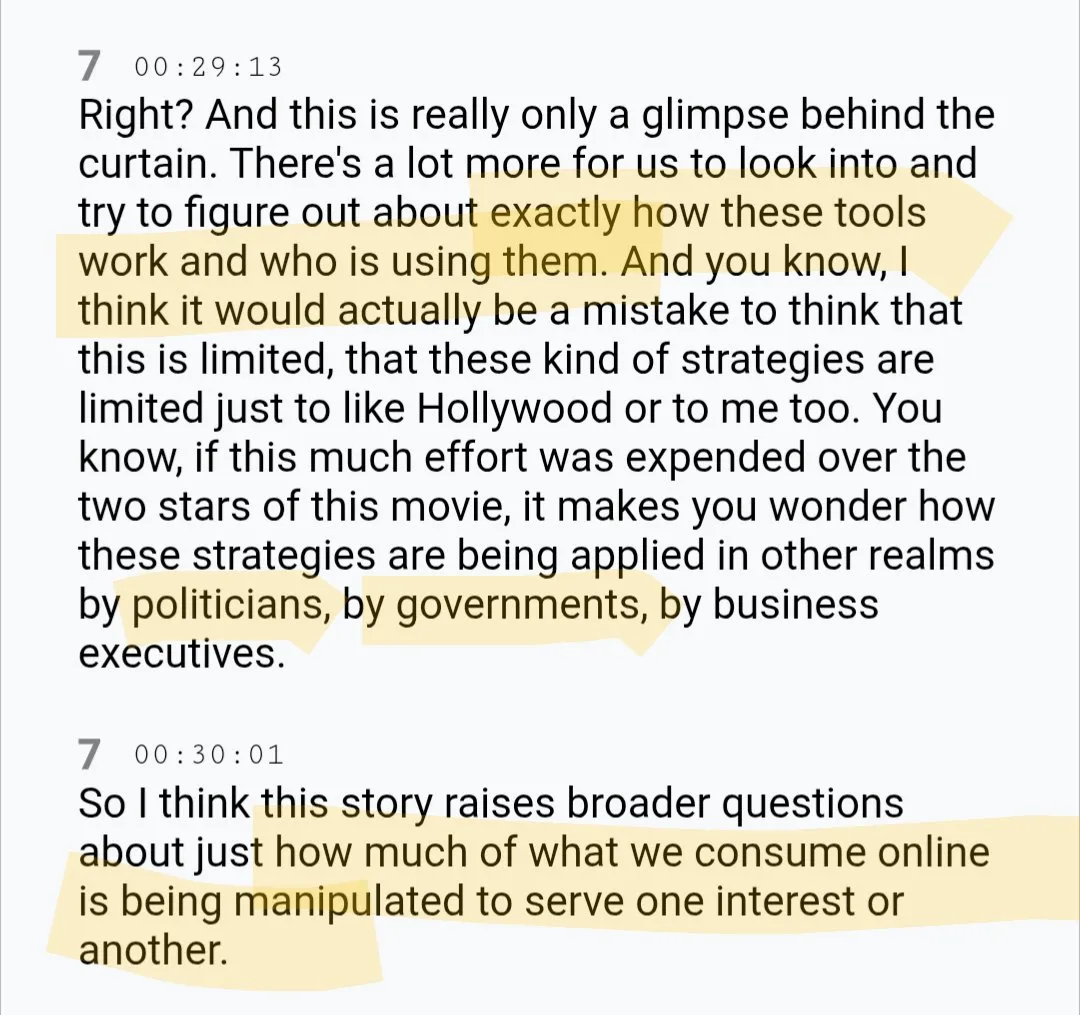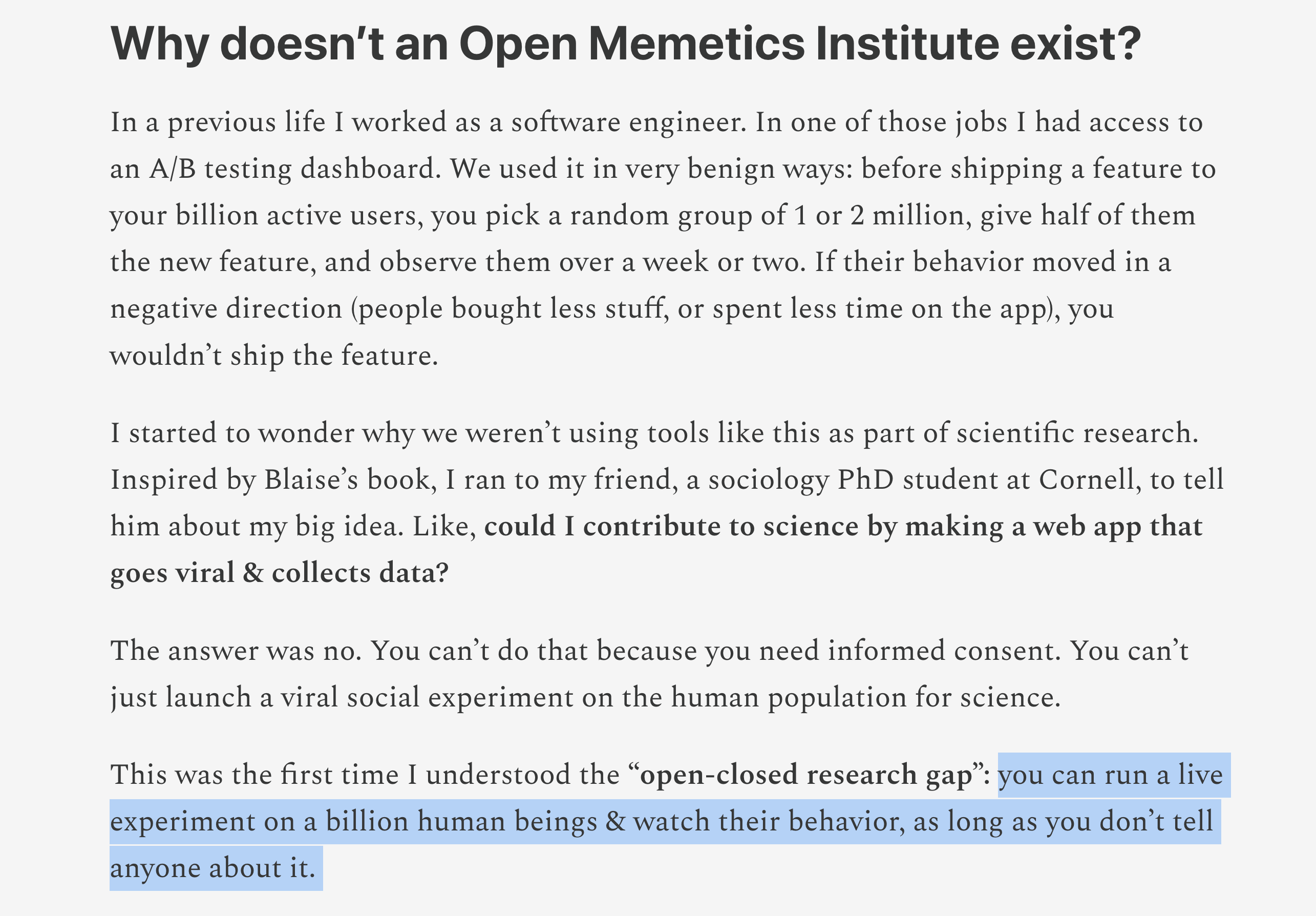Response to Kasra:
I don’t think I ever got the pitch for what memetic engineering actually is or why it’s good haha. where’s the best place for that / what’s an example of a problem this solves?
So the basic pitch is: cultural/social engineering is already happening for nefarious purposes. In January the NYT basically spelled out how psyops work . They explained that there are secret companies/people you can pay to spread a narrative, and that it works, at scale:

This is really bad for the epistemic commons. At MINIMUM i need to know if secret coordination is happening. If everyone is suddenly talking about product X, I want to know if they were paid to do so or if it’s organic.
The good news is: this is not hard to find out! The “narrative contagion institute” (https://networkcontagion.us/technology/) tries to do this:
The NCRI can detect coordinated and inauthentic activity and shows how amplified disinformation operations from state actors and extremist groups take aim at American brands
Months before NYT wrote about this social engineering / hollywood smear campaign, someone on twitter actually found evidence of it happening (because you can see like 1000 accounts retweeting the same thing within minutes):
I think Justin Baldoni’s PR team is using a mercenary army of twitter bots to smear Blake Lively and repair his own reputation. First, a description of my investigation. Then, a dossier on the 2,689 bot accounts I found, plus several dozen specific tweets they boosted.
Kasra you made a great point here about, why are even trying to “engineer” it?
the aspect of it that doesn’t fully resonate with me is the idea of “engineering” or attempting to “control” culture, culture feels like it has to be a bottom up thing. I’m gonna think more about this
That is the goal! But that’s not the world we live in today.
Did you see the April university of zurich scandal? They ran a secret experiment on a subreddit to see if they could change people’s minds with bots (it was successful):
People were obviously outraged, but the researchers were like, “but…everyone is ALREADY doing this, at scale. People are very easy to manipulate. Shouldn’t we study this to protect ourselves?”
This is where our work comes in. I am trying to close the gap between “dark memetics” and “open memetics”. People studying this openly, like zurich, or my sociology friends at cornell, have their hands tied. People doing it in the dark (like marketing companies and smear campaigns, or governments) have no restrictions.
Science communication about memetics, about propaganda techniques, about how ideas spread, changes the game, it interferes with the work of those doing it in the dark.
The frontier of dark memetics looks VERY different from the frontier of open memetics. On the open side we’re still talking about “is this possible” and “if there exist propaganda techniques, wouldn’t making them legible be dangerous?”
On the dark side, they’re actively at war.
Appendix
- Open Memetics R&D - Grant Proposal google doc. Wrote this for Kanro (https://kanro.fi/). Also used it for Analogue (https://analoguegroup.org/expeditions/explorers)
In the tech industry, we publicly study & document security vulnerabilities. We reward white hat hackers who disclose their work for the public benefit. This transparency helps good actors coordinate on defensive strategies.
Human minds can be “hacked” through narratives, and we have no coordinated defenses.
I wrote about the “open-closed” research gap recently. At big tech social media companies, we can do these beautiful studies of human behavior with A/B testing.
 from: https://defenderofthebasic.substack.com/p/the-human-memome-project
from: https://defenderofthebasic.substack.com/p/the-human-memome-project
When something “goes mainstream”, it’s either:
- Organic, a newsworthy thing happened, and it is being reported
- A coordinated attack. The thing they are reporting is true, but the narrative is not. It’s serving an ulterior motive
It’s possible that 90% of the news is 1, and only 10% is 2. But not knowing which is which makes it hard to trust any of it.
There is an easy cure at the personal level: make a friend in that field.
Some people have started calling it “memetic gardening” instead of engineering.